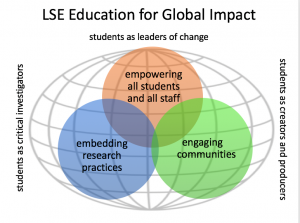There’s never been a better time for the LSE, one of the leading social science schools in the world, to launch a new higher education blog. While political, economic and cultural changes and tensions whirl around us, universities are working year by year to fulfil our complementary missions of education and research. But if we are to do that successfully, both within each higher education (HE) institution and across the sector, we need to create spaces for dialogue about what we’re doing, what needs to change and how we can work in partnership with others to ensure that we’re making the most positive kinds of impact on the world.
Why is LSE launching a higher education blog? As a school committed to changing the world through the social sciences, we recognise the interconnectedness of expertise that can and should be applied to the wicked problems we face. In 2019 we are launching a new strategy, LSE 2030, in which we articulate our goals. These are values-based and underpinned by three guiding principles: excellence built from diversity and inclusion, global impact and reach and ensuring a sustainable future.
Building on LSE’s foundational intention to be ‘a community of people and ideas, founded to know the causes of things, for the betterment of society,’ LSE 2030 commits us to step up to a new era. We have set ourselves the challenge of applying LSE’s expertise ‘to ensure that – through our research, through the graduates we shape, and through our collaborations locally, nationally and globally – we are the leading social science institution with the greatest global impact.’

This framework shapes a number of priorities for the LSE community as part of our LSE 2030 objectives. These centre round ensuring that every student feels included in and intellectually connected with our research community:
- LSE students will have agency in their own learning, charting a personal trajectory through a diverse range of courses and assessments, while building a coherent, holistic picture of their disciplines(s).
- We will involve LSE students with the School’s outstanding research culture, through embedding enquiry-based learning and research practice at all levels of the curriculum including through the effective application of cutting-edge digital technologies.
- We will enhance and expand the innovative LSE 100 programme to enable LSE undergraduates to work as critical investigators in interdisciplinary teams to tackle complex social questions.
- We will challenge LSE students to develop their ethical awareness, to learn to persuade and not to silence, and to engage in robust but respectful debate with diverse views. We expect LSE students to act with integrity and learn to reflect critically on their own biases.
- We will provide our faculty with the support and advice required to become and remain excellent educators and we will recognise, celebrate and reward excellence in education.
The commitment to enabling students to become agents of change is exemplified in a range of specific ways, including our LSE Change Makers scheme, which invites students to investigate the school’s education-related practices in order to improve them. Key here is preparing students for the future, and doing so in ambitious and innovative ways over the coming years. Offering students opportunities to showcase their work to external audiences and partners, a key dimension of the Connected Curriculum approach, is one direct way in which their learning and investigative findings can make an impact on external organisations and policy makers even as they are studying with us. We are actively looking at ways of engaging alumni, organisations, policy makers and employers in developing effective ways of including external partners, where appropriate, in students’ projects and debates.
In addition, we are deeply committed to ensuring that the school becomes a more inclusive community that is reflected in an inclusive curriculum. We aim to foster a strong sense of community and belonging among all our students, provide holistic and comprehensive support for every student including a student-centred induction experience and a place for every first-year student in an LSE residence, and widen access and significantly increase financial and other support for students. Finally, but by no means least, LSE 2030 articulates our aim to provide lifelong educational experiences for local, national and international communities through offering a continuum of on-going learning opportunities for alumni and other professionals and the wider community.
In light of our newly articulated commitment to making the maximum impact for good in the world, this HE blog will be a vehicle for sharing evidence-based investigations within and across the social sciences. It will enable us to highlight and explore good practices, adding to case studies currently being developed by LSE’s Teaching and Learning Centre. But, most importantly, it will be a space for dialogue for a plurality of voices, bringing different communities together – academics, academic developers, scholars, researchers, students, educators, partners – to identify not only how we can provide the best possible education for every student at LSE, but also how higher education more widely can become increasingly relevant to societies in need of answers.
We want you to engage with this blog, whether you are a faculty member, professional, student, graduate or partner, and whether you are based at the LSE or elsewhere. If your field has something to say about higher education and about how we can make even more impact for good in the world, your voice needs to be heard. We look forward to sharing in new insights and lively future debates.
Image: Dave Smith with Antigoni Boulangari from the Communications Division at the LSE 2030 strategy launch
Disclaimer: This post is opinion-based and does not reflect the views of the London School of Economics and Political Science or any of its constituent departments and divisions.



Thank you for launching this higher education blog?
Thank you for taking the time to create this and being keen on having a dialogue with public about important issues!
¡Muy fresco! ¡Algunos muy puntos válidos! Le agradezco escribir esto artículo más el resto del sitio es extremadamente bueno